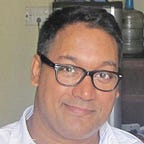What if it were Barkha Dutt, and not Madhu Kishwar, who got served a non-bailable warrant?
Noted journalist and activist Madhu Kishwar has been served a non-bailable warrant by the Chief Judicial Megistrate of Kashmir in the wake of a defamation suit filed by Shujaat Bukhari. He is the editor of Rising Kashmir, a newspaper often accused of carrying out Pakistani agenda on Indian soil. Not surprisingly, he is also the former Bureau-Chief of The Hindu, Kashmir.
Something that is public knowledge was articulated by Madhu Kishwar in one of her tweets.
In the tweet, as you can read Madhu has indicated that Shujaat Bukhari gets money from the Indian government for his publication and then spews venom against India.
The entire account of what happened after her tweet is explained in this post:
Here’s another very nicely written piece on the same subject on this OpIndia link:
As it normally happens, there’s pin drop silence in the mainstream media.
Worst statements have been made against Narendra Modi and if he started filing defamation suits, and if non-bailable warrants begin to roll out with the same alacrity as this one, more than 80% of our journalistic fraternity would be behind bars by now.
Here I’m going to do some vocal thinking about what would have happened if a non-bailable warrant had been issued against, let’s say Barkha Dutt (she represents an understandable category), instead of Madhu Kishwar, for the same reason, that is, publicly accusing a public figure of carrying out a propaganda and getting some sort of money (in any manner, by any means).
The entire left-lib journalistic machinery would have been set in motion. She would have tweeted a chain of messages decrying the total lack of freedom of speech in the country in the new political dispensation. The usual clique of journalists, artists, historians, authors and “eminent” intellectuals would have retweeted her messages with their own commisserative expositions.
#IStandWithBarkha would have started trending. A hash tag emoji with Bakha’s face would have been created for a hash tag like #FreedomOfSpeech. Thousands would have made their Twitter and Facebook DPs black.
Shabana Azmi would have tweeted that minorities are feeling threatened with the #IStandWithBarkha hash tag and people like Irfan Habib would have retweeted stressing the point that freedom of speech has never been attacked like this before anywhere in the world and even archaeological proofs indicate that.
Kejriwal would have tweeted that this attack on freedom of speech is a slap on Narendra Modi’s face and Modi should be ashamed of himself. He would have also prompted Barkha to join AAP. He would have put up banners saying “Modiji hume to kaam nahi karne dete, Barkha ko to karne do”. Ashutosh would have wailed.
The TMC would have disrupted the parliament and the Congress would have staged a “massive” walkout.
A solidarity walk, lead by Rajdeep Sardesai and Shekhar Gupta would have been organized by the “freedom of speech loving” journalists, holding banners stating, “Long live journalism”.
Ram Guha would have used this as another opportunity to educate the West about how freedom of speech and journalism are being throttled in India.
Arun Shourie would have appeared in another TV interview and reiterated that Narendra Modi is the most stupid PM India has ever had.
The Saudi Arabian ambassador at the UN would have vociferously decried this attack on freedom of speech, and especially on a woman journalist.
Obama would have advised India to exercise caution and revisit Mahatma Gandhi’s various messages.
Raveesh Kumar would have created another program with black screen, or if he were busy consoling his brother (who is accused of running a sex racket) and his sister (who is accused of corruption), maybe Prannoy Roy would have pitched in.
Hafiz Saeed would have used the opportunity to issue another warning to Zee News.
Nidhi Razdan would have suggested to her panelists to stop looking at the broader picture and focus on the narrower issue.
Arundhati Roy, with an air of interminable tragedy around her, would have delivered multiple speeches on how Gandhi is being killed in India repeatedly. Outlook would have published a compilation of her speeches on the topic.
Some association of journalists in France or Canada would have declared India as the most hostile territory in the world for journalists and would have bestowed an unpronouncable journalistic award upon Barkha.
Publications like Huffington Post, Washington Post, QZ, Guardian and New York Times would have carried out editorials and opinion pieces on how freedom-loving journalists live in great mortal fear in India, and how they constantly get the dreaded midnight knock. They would have started asking if India is not a good place for democracy. They would have also published some articles suggesting how the current government can be overthrown using some clauses in the Constitution.
PB Mehta would have written another angry piece in Indian Express with an addendum by the newspaper that the writer has been forced to go into hiding. The Indian Express headline of the day would have been “And they have attacked Barkha Dutt”.
Hindustan Times would have published an obituary of journalism.
Munawwar Rana would have penned a requiem for the “good old days”.
The face of journalism would have been considered, changed, and besmirched, forever.
Barkha Dutt would have gotten a lucrative book deal.
